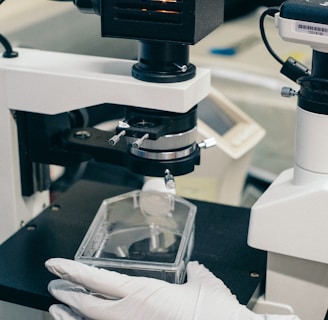Reprogram Your Cells, Repair Your Body: The Vitamin B12 Revolution in Regenerative Medicine
Imagine a world where your own cells can heal and regenerate. That's the promise of cellular reprogramming, and Vitamin B12 is key. This research reveals how B12 unlocks this potential, paving the way for treating everything from injuries to chronic diseases.
DR T S DIDWAL MD
5/20/20244 min read


A groundbreaking study in Nature Metabolism reveals vitamin B12 as a hidden star in cellular reprogramming. It fuels the process but gets depleted, slowing things down. Replenishing B12 revs up efficiency in cells thanks to its role in methylation, a crucial epigenetic tweak. B12 also fine-tunes a specific histone mark, potentially impacting "rogue transcription." The study explores gut bacteria's role and even hints at B12's potential to treat ulcerative colitis. This research unlocks the power of B12, opening doors for regenerative medicine and beyond.
Key Points
1. Vitamin B12 as a Limiting Factor:
Cellular reprogramming demands high amounts of B12.
B12 insufficiency hinders reprogramming efficiency.
Supplementation improves reprogramming both in vitro and in vivo.
2. SAM and One-Carbon Metabolism:
B12 fuels the generation of S-adenosylmethionine (SAM), which is crucial for methylation reactions.
SAM plays a central role in epigenetic reconfiguration during reprogramming.
B12 deficiency disrupts histone methylation patterns, impacting reprogramming.
3. Beyond H3K36me3:
SAM's influence extends beyond specific histone marks, likely affecting other methylation processes.
Further research is needed to understand the full scope of B12's epigenetic impact.
4. Microbiota's Role:
Gut bacteria contribute to B12 availability and may influence reprogramming indirectly.
The complex interplay between the microbiota, B12, and reprogramming requires further investigation.
5. B12 in Ulcerative Colitis:
B12 supplementation promotes intestinal epithelial repair in a colitis model.
This finding suggests potential therapeutic applications for B12 in inflammatory bowel disease.
6. B12's Potential in Regenerative Medicine:
The study paves the way for exploring B12's role in enhancing tissue repair after injury.
B12 could become a valuable tool for accelerating recovery and promoting tissue regeneration.
In the realm of cellular reprogramming, a groundbreaking study has shed light on the pivotal role of vitamin B12 in driving enhanced efficiency both in vitro and in vivo. Let's delve into the intricacies of this research and explore how vitamin B12 emerges as a key player in the fascinating world of regenerative medicine.
Unlocking the Mysteries: Vitamin B12 as a Limiting Factor
The Cellular Symphony: Vitamin B12 and Reprogramming Efficiency
The study reveals a surge in demand for vitamin B12 during cellular reprogramming, with a direct correlation to the B12-dependent enzyme MS and the expression of Cd320, the cellular vitamin B12 uptake receptor. This orchestration is crucial as MS generates Met, a precursor converted into S-adenosylmethionine (SAM), the essential donor for methylation reactions. The significance lies in SAM's central role in improving reprogramming efficiency and steering the process towards success.
Unraveling the Epigenetic Dance: SAM and One-Carbon Metabolism
One-carbon metabolism, driven by SAM's methyl group donations, proves indispensable for the epigenetic reconfiguration accompanying cell reprogramming. Vitamin B12 insufficiency during reprogramming leads to alterations in histone methylation marks, highlighting the intricate dance between B12, SAM, and the epigenome. Notably, supplementation with vitamin B12 counteracts these changes, fostering an environment conducive to efficient transcriptional reprogramming.
Beyond H3K36me3: Exploring the Wider Impact
Sentinel Metabolite: SAM's Multifaceted Influence
While the study emphasizes the role of H3K36me3 in the reprogramming process, it hints at broader implications. SAM, deemed a 'sentinel metabolite,' governs diverse substrates within eukaryotic proteins. The research invites curiosity about the additional histone H3 methyl changes induced by B12 supplementation and their potential contributions to improved reprogramming efficiency.
Microbiota's Role in the Reprogramming Symphony
Microbial Harmony: Microbiota's Influence on Reprogramming
In vivo experiments unveil the profound impact of the microbiota on reprogramming, with broad-spectrum antibiotics limiting the process. Interestingly, B12 supplementation only partially rescues this limitation, suggesting the microbiota's multifaceted role. The intricate link between inflammation, IL-6 production, and in vivo reprogramming becomes apparent, raising intriguing questions about the interplay of commensal bacteria, doxycycline, and reprogramming dynamics.
Translating Discoveries: B12 in Pathological Models
Bridging Bench to Bedside: B12 in Ulcerative Colitis
The study extends its findings into a pathological disease model of acute ulcerative colitis, showcasing the role of vitamin B12 in facilitating intestinal epithelial repair. The potential therapeutic impact of B12 in human disease, particularly inflammatory bowel disease, emerges as a promising avenue for further exploration.
A Glimpse into the Future: B12 in Regenerative Medicine
From Tissue Injury to Repair: B12's Therapeutic Potential
As tissue injury and repair often involve transient dedifferentiation, the study proposes a novel approach. Administering vitamin B12 during the injury repair period may promote cellular plasticity and expedite recovery. The DSS model of acute ulcerative colitis demonstrates the tangible benefits, with both OSKM expression and continuous B12 supplementation significantly improving tissue recovery and promoting homeostasis.
In conclusion, this research unlocks the potential of vitamin B12 as a game-changer in cellular reprogramming and tissue repair. As we unravel the intricacies of B12's impact on the epigenome and microbiota-driven processes, the door opens to a future where B12 becomes a therapeutic ally in regenerative medicine, organ injury, and repair. The journey from bench to bedside beckons, with vitamin B12 poised to play a pivotal role in shaping the landscape of medical advancements.
Reference Article
Kovatcheva, M., Melendez, E., Chondronasiou, D. et al. Vitamin B12 is a limiting factor for induced cellular plasticity and tissue repair. Nat Metab 5, 1911–1930 (2023). https://doi.org/10.1038/s42255-023-00916-6
Related
Medical Disclaimer
The information on this website is for informational purposes only and is not intended to be a substitute for professional medical advice, diagnosis, or treatment. Always seek the advice of your physician or other qualified health care provider with any questions you may have regarding a medical condition or treatment. Never disregard professional medical advice or delay in seeking it because of something you have read on this website.
